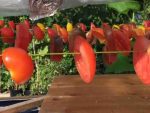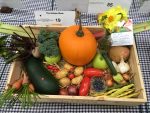

Maintaining soil and structures and planning ahead
- Continue to clear all plant debris from plots. Do not add blighted tomatoes to your compost, but burn or take to the dump.
Empty compost heaps and use the well-rotted dark crumbly material. - Apply a 5cm layer of well rotted compost or manure to bare plots or cover bare areas with brown cardboard weighed down with damp grass clippings.
- Prepare a winter compost trench for next season’s moisture loving plants such as sweet peas, runner beans or squashes. Dig a trench a spade deep and fill with kitchen vegetable waste covering each additional layer with soil.
Sowing and planting
- Continue to sow overwintering broad beans.
- Sow hardy peas either straight into the ground under fleece or 3 to a 9”pot to be planted out when the roots reach the bottom.
- Sow a gutter of peas in the green house or under cloches for salad or risotto at Christmas time.
- Sow cut-and-come-again salads in a sheltered spot or green house.
- Finish planting onion sets and garlic.Garlic needs a chilling period so plant now. With current wet winters plant on a ridge to aid drainage.
- Sow dill, chives and parsley now on a sunny windowsill.
- Order bare root trees now for the best selection.
- Fix grease bands to fruit trees to protect against winter moth. To help control pests and diseases spray fruit trees with winter wash on a calm, dry day.
- Once leaves have dropped and before bud break in February spray fruit trees with winter wash on a calm, dry day. Spraying helps to reduce overwintering pests.
- Start winter pruning of apples and pears.
- Keep overwintering brassicas covered with netting to prevent pigeon damage.
- Stake tall brassicas against wind damage.
- Sow green manures early in the month such as grazing rye.
- Clean the greenhouse to maximise light levels and before the water is turned off in December.
Harvesting
- Start to harvest winter cabbage, Brussels sprouts, leeks and kale. Wait until after frosts for parsnips as they will be sweeter.
Pruning
- Begin winter pruning of apples, pears and vines.
- Prune overgrown blackcurrant bushes- remove a third of the oldest stems to ground level.
- Fruited canes of blackberries and hybrid berries such as tayberries and loganberries should be pruned to ground level.
Gardening for wildlife
- Remove surplus dead leaves from ponds to prevent decomposition pollution.
- Clean out bird boxes of old nesting material so they may be used as winter roosts.
